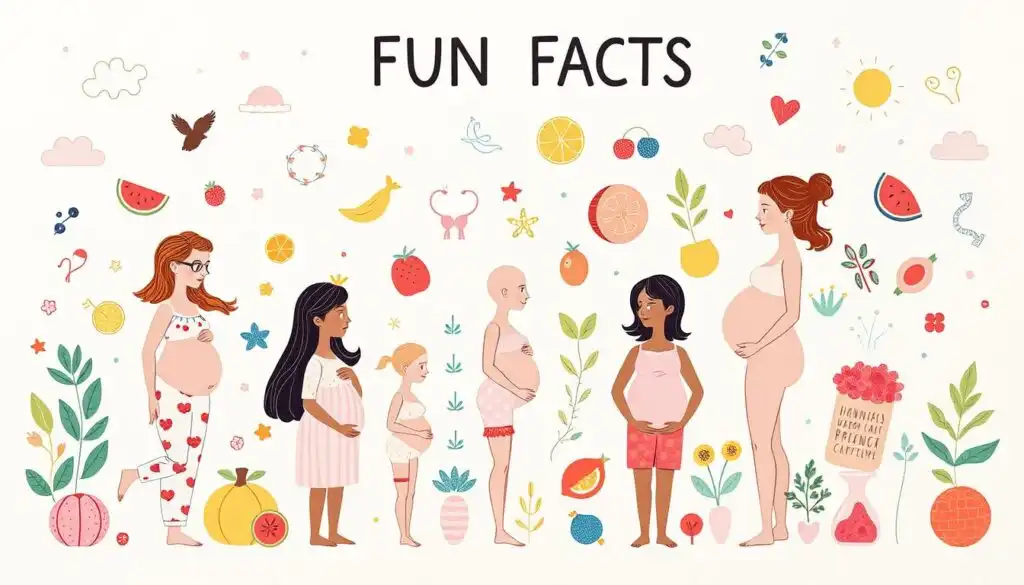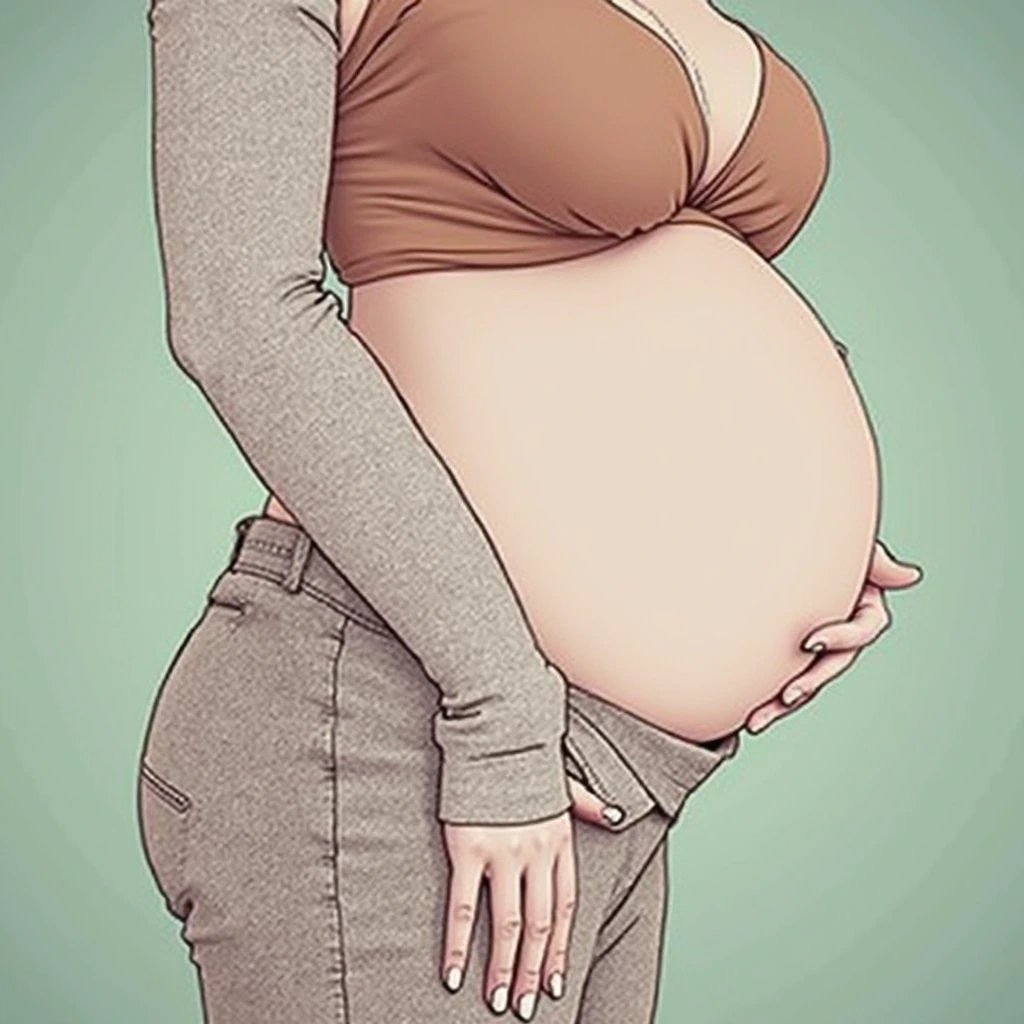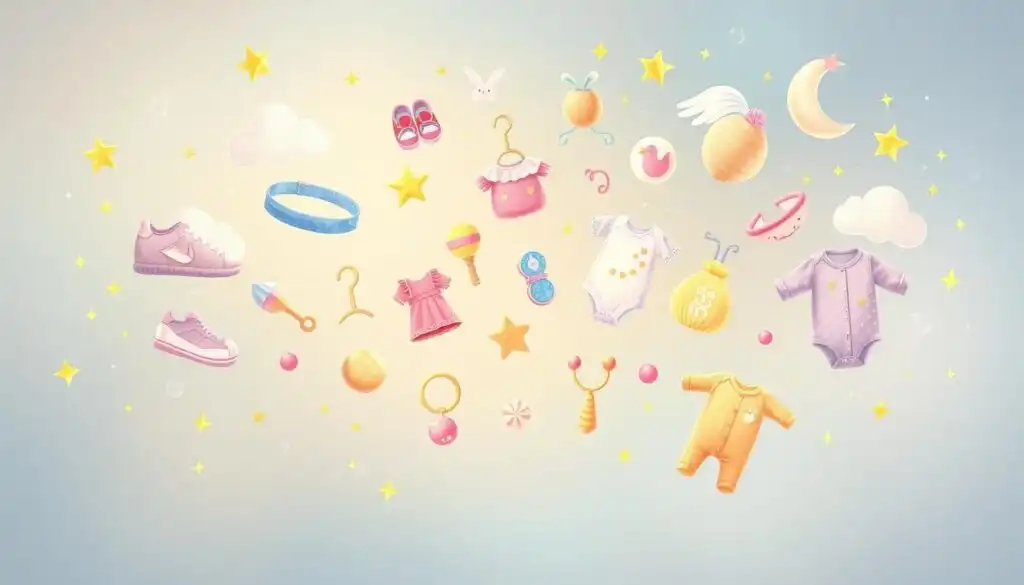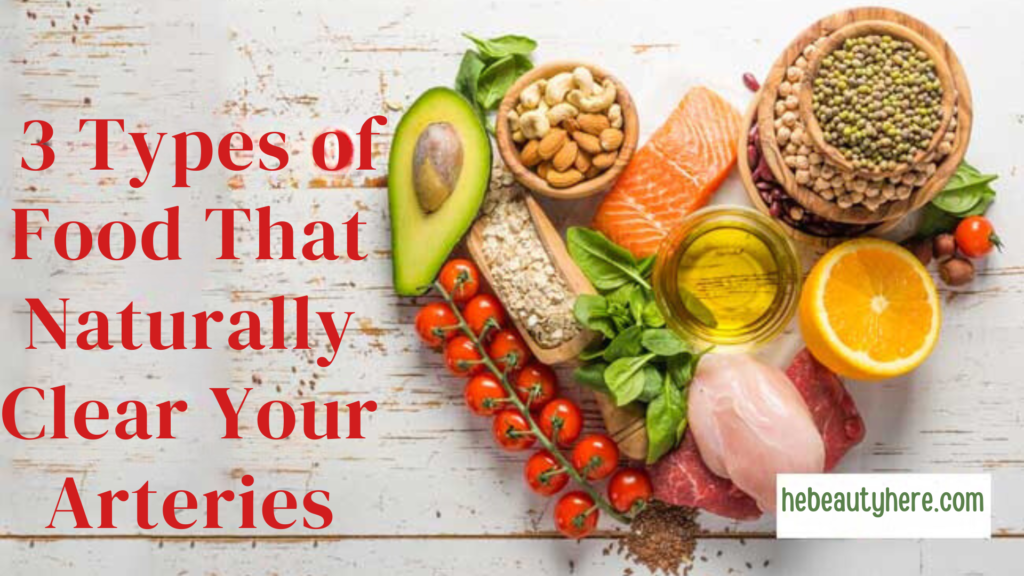Pregnancy is a journey filled with surprises and fascinating facts. It includes the uterus’s amazing growth and the fetus’s detailed development. Did you know only 5% of babies are born on their due date? Most arrive a week before or after, with pregnancies lasting about 40 weeks. fun facts about pregnancy
Your body changes a lot to support your growing baby. Your blood volume can grow by 40-50% to give your baby the needed oxygen and nutrients. The uterus starts as small as an orange in the first trimester. By the third trimester, it grows to the size of a watermelon, weighing up to two pounds.

Pregnancy is a remarkable and awe-inspiring experience. It’s filled with surprises and wonders that often go unnoticed. Explore the amazing facts that make this journey so unique and special.
Understanding Pregnancy Body Changes
Pregnancy is a remarkable journey filled with physical changes. As your pregnancy grows, you’ll see big changes that help your baby grow. These changes include more blood, hormonal shifts, and physical signs that show your body is adapting.
Blood Volume Increase and Circulation
One key change is the increase in blood volume. Your blood can grow by up to 50% to support your baby and placenta. This extra blood flow helps your baby get the oxygen and nutrients it needs for growth.
Hormonal Changes and Their Effects
Pregnancy brings big hormonal changes that affect your body and senses. Hormones like estrogen and progesterone can make smells stronger and give you a “pregnancy glow.” They also loosen your joints and ligaments, getting your body ready for childbirth.
Physical Transformations During Pregnancy
As your pregnancy advances, you’ll see many physical changes. Your uterus will grow, and you might need bigger shoes. Relaxin, a hormone, makes your ligaments loosen, which can widen your hips and feet.
You might sweat more as your body tries to keep cool. Stretch marks can appear on your belly, breasts, and thighs as your skin stretches for your baby.

Your Baby’s Development in the Womb
As your pregnancy goes on, it’s amazing to see your baby grow inside you. From the start of fetal development to the big milestones in the womb, it’s incredible. Your baby’s growth is truly a marvel.
In the embryonic stage, from weeks 3 to 8, your baby’s main systems start forming. By the end of the first trimester, your baby is about the size of a plum. They have a well-formed face and visible genitals.
When your baby enters the fetal stage, they grow fast. By week 22, they have lanugo hair, make meconium, and their heartbeat can be heard. In later stages, their eyelids open and close, and their lungs start to work.

In the final weeks, your baby goes through big changes. Their fingernails grow beyond their fingertips, and both sexes have breast buds. This shows the incredible growth and wonders of pregnancy.
Fun Facts About Pregnancy: What Nobody Tells You
Pregnancy is a remarkable journey, filled with both expected and unexpected experiences. While most people know about morning sickness and a growing belly, there are surprising facts. These include the truth about due dates and emotional and mental transformations.
The Truth About Due Dates
Only about 5% of babies are born on their exact due date. The due date is an estimate based on your last menstrual period. But, the baby’s position, your body’s readiness, and your pregnancy can affect when you give birth.
Surprising Physical Changes
Pregnancy brings unexpected physical changes. For example, your feet may grow larger due to relaxin hormone. You might also notice your voice becoming lower in pitch because of hormonal changes.
Emotional and Mental Transformations
The emotional and mental changes during pregnancy are significant. “Baby brain” is real, as your brain becomes smaller but more efficient. You might also experience unusual cravings and a heightened sense of smell. Plus, you could get a “pregnancy glow” from increased blood flow and oil production in your skin.
Pregnancy is a journey filled with surprises, both delightful and unexpected. By understanding these lesser-known facts, you can better navigate the wonders and challenges of this transformative experience.

Sensory Changes During Pregnancy
Pregnancy brings many changes, including a stronger sense of smell. Studies show that two-thirds of expectant mothers notice smells more during this time.
This increased sensitivity to smells is called hyperosmia. It often starts in the first trimester. Suddenly, smells that were once unnoticed can become overwhelming. The hormone estrogen is thought to cause this heightened sense of smell.
Changes in taste preferences also happen during pregnancy. The baby’s taste buds start to develop, influenced by the mother’s diet. This can shape the child’s food preferences later on.
The changes in smell and taste are just a few examples of what happens during pregnancy. Understanding these changes can help expectant mothers navigate this special time.
The Science Behind Pregnancy Cravings and Aversions
Pregnancy brings many changes, including how we feel about food. Many expecting mothers find their tastes changing. These changes are often linked to the body’s needs and hormonal shifts.
Why Food Preferences Change
Up to 90% of women in the U.S. experience pregnancy cravings. These cravings are most intense in the first trimester. Hormonal changes, nutritional needs, and aversions play a role in these cravings.
Common Cravings Explained
In the first and second trimesters, many crave salty foods. This is because the body needs more sodium. Sweet cravings might be due to low blood sugar or increased calorie needs. Some even crave unusual combinations like peanut butter and pickles.
Managing Food Aversions
Food aversions are common too, often because of a stronger sense of smell. These can change over time. It’s key to stay open to new foods and keep a balanced diet. Staying hydrated and knowing what triggers aversions can also help.
Amazing Facts About Fetal Development
As your baby grows in the womb, it’s a truly amazing journey. Babies are born with more bones (around 300) than adults (206). This is because some bones fuse together as they grow.
Taste buds start forming as early as 8 weeks in the womb. This lets your baby taste flavors through the amniotic fluid.
Your baby can hear in the womb and might even recognize your voice. They practice crying, showing facial expressions and breathing patterns. They also yawn, which helps with brain development.
The startle reflex starts around 25 weeks gestation. It’s a key survival mechanism.
The journey from zygote to fully developed fetus is fascinating. Your baby’s heart starts beating at 5 weeks. By 8 weeks, their brain, spinal cord, and vital organs are developing.
As weeks go by, your baby’s senses, movements, and unique traits emerge. It’s an incredible journey of growth and milestones.
Your Changing Brain During Pregnancy
Pregnancy is a remarkable journey, marked by physical and brain changes. Research has shown the amazing ways our brains adapt and process emotions during this time. fun facts about pregnancy
Cognitive Changes and “Baby Brain”
Pregnancy causes the brain’s gray matter to shrink. This change lasts at least two years after giving birth. It helps mothers better respond to their newborns, known as “baby brain.”
The brain areas for social cognition, like understanding baby cues, change the most. This shows how brain adaptations help with caregiving.
Women might feel memory problems or a foggy mind during pregnancy. But, it doesn’t mean they’re less smart. It’s just their brain focusing on the baby’s needs.
Emotional Processing Adaptations
Pregnancy also changes how we process emotions, preparing us for parenthood. Hormonal changes, like more estrogen and progesterone, shape our emotional state. This makes us more sensitive, empathetic, and connected to our baby before birth.
Though we’re still learning about these changes, research shows how amazing our brains are during pregnancy. They adapt to support this incredible journey of motherhood.
Fascinating Facts About the Uterus and Growth
During pregnancy, the uterus goes through amazing changes. It can grow up to 500 times its normal size. It changes from the size of a large apple to a watermelon. By the end of pregnancy, it can weigh as much as two pounds, a huge increase from its pre-pregnancy weight of about an ounce.
This big change helps the growing baby, placenta, and amniotic fluid fit inside. The body changes to support the growing life. It’s amazing how the uterus and body adapt during this time.
Did you know that about 1 in 5 women have a tilted uterus? This can make things like tampon insertion or certain sexual positions harder. Also, a very rare condition called uterus didelphys, where a woman has two uteruses, doesn’t stop conception or a healthy pregnancy.
The uterus’s ability to adapt during pregnancy shows how strong and amazing the human body is. Learning about these facts helps us appreciate the incredible changes the uterus goes through during pregnancy.
The Truth About Labor and Delivery
Pregnancy and childbirth are amazing journeys, but they’re also full of myths. Labor and delivery are not as expected. For example, only 1 in 10 women have their water break before labor starts. This is just one surprising fact about giving birth. fun facts about pregnancy
Common Misconceptions
Many think nausea, vomiting, or diarrhea don’t happen in labor, but they do. The birthing process doesn’t stop with the baby’s arrival. The delivery of the placenta is also key.
Postpartum bleeding can last weeks, and stitches might be needed. This is due to tearing or an episiotomy.
What Really Happens
During labor, contractions can hurt in the abdomen, back, and groin. The pain’s intensity and how long it lasts can change. Despite the challenges, the body is made for childbirth. Medical teams are there to help and support you.

Newborn Development and Abilities
When your little one arrives, they bring a world of fascinating skills and abilities. Newborns have about 300 bones, which will merge into the 206 bones adults have. This flexibility helps with delivery and supports their growth.
Newborns can’t cry tears until they’re about 3 weeks old. Also, breastfed babies eat more often than formula-fed ones. They sleep a lot, around 16 hours a day, in short bursts to meet their feeding needs.
Newborns can recognize their mother’s voice from before birth. This early bond helps them feel secure and connected. While early smiles might seem like reflexes, real social smiles start around 6 weeks. Separation anxiety usually kicks in between 8 to 12 months.
Watching your baby’s newborn skills, infant development, and baby milestones grow is amazing. Enjoy the journey of discovery and the special bond you’re building.
Conclusion
Pregnancy is a remarkable journey, filled with surprising changes for both the mother and the developing baby. From the remarkable increases in blood volume and hormonal shifts to the incredible physical transformations and fetal development, each pregnancy experience is truly unique. fun facts about pregnancy
By understanding the various aspects of the pregnancy journey, including the maternal changes and fetal milestones, expectant parents can better prepare for the challenges and joys that lie ahead. Whether it’s the unexpected increase in skin pigmentation, the development of a baby’s senses, or the potential for multiple births, this pregnancy knowledge can provide valuable guidance and perspective. fun facts about pregnancy
Remember, while statistics and averages offer helpful insights, every pregnancy is individual. Embrace the wonder of your own pregnancy journey, celebrate the maternal changes, and marvel at the incredible fetal development unfolding within you. The path to parenthood is a transformative experience, and understanding these fascinating facts can enrich the experience for the entire family. fun facts about pregnancy
Discover more trends:
- Sunscreen Secrets: 9 Must-Know Facts for Ultimate UV Protection
- What Happens If You Take Birth Control While Pregnant – he here
- Top 10 Habits Most Detrimental to Accumulating Belly Fat
- Hailey Bieber’s Pregnancy Journey: Everything We Know So Far
- Justin Bieber elucidates why Hailey postponed having children sooner.
- Follow us on Facebook
- Follow us on Pinterest





